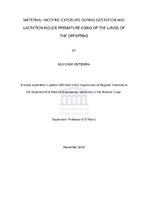| dc.description.abstract | Tobacco smoking remains one of the leading causes of death worldwide. Despite all the efforts made by governments, researchers and communities to educate women about the dangerous effects of tobacco smoke and nicotine, smoking during pregnancy continues to be a common habit and accounts for a significant percentage of fetal morbidity and mortality. The offspring is, as a result, exposed to nicotine through the blood and the milk of the mother. Nicotine is therefore expected to interact with the developing fetus and the offspring of mothers who smoke or use Nicotine Replacement therapy for smoking cessation, resulting in the interference with normal fetal lung development. Maternal cigarette smoke or nicotine exposure produces adverse effects in the lungs of offspring, these include; intrauterine growth retardation, low birth weight, premature birth, reduced pulmonary function at birth, and a high occurrence of respiratory illnesses after birth. The main objectives of this study were to determine: 1) the effects of maternal nicotine exposure during gestation and lactation on lung development in the offspring, 2) if there is evidence of premature aging of the lungs of the lungs of the nicotine exposed offspring, and 3) whether tomato juice can have protective effects on the fetal lung development and function in the offspring. From the study, it was established that maternal nicotine exposure had no significant effect on the growth parameters of the offspring. However, it results in the late onset of gradual parenchymal damage which resembles premature aging. The study also found that the consumption of tomato juice may have protective effects on the premature aging of the lungs of the offspring. | en_US |

